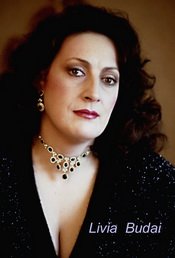Lívia Budai graduated from the Ferenc Liszt Academy of Music in 1973 and signed with the Musiktheater im Revier in Gelsenkirchen in 1977. She enjoyed tremendous acclaim at her London debut at Covent Garden in the role of Azucena in Il trovatore, with Carlo Bergonzi as her partner. In San Francisco, she portrayed Eboli in Don Carlos. For nearly ten years starting in 1980, she sang every well-known dramatic mezzo-soprano role in the operatic literature as a member of Munich's Bayerische Staatsoper. She repeated her role as Eboli at the Wiener Staatsoper, as well. She partnered with Montserrat Caballé in Madrid, in Donizetti's Maria Stuarda and took the stage with Plácido Domingo in Berlin in Ponchielli's La Gioconda. For some years, she was a welcome guest in all of the world's leading opera houses, with the Hungarian singer being celebrated by audiences in Hamburg, Rome, Florence, Bologna and Barcelona. She considers her important developments of 1985 to include her involvement in Radio France's production of Bartók's Bluebeard's Castle and her performance of the role of Ada in Luciano Berio's contemporary opera La vera storia, which she repeated in Florence and Amsterdam after first singing it at the Palais Garnier in Paris. In 1986, in Antwerp, she gave her first portrayal of Delila in Saint-Säens's Samson et Delila, a role she later repeated to great acclaim in Liège and Bonn. She made her debut at Verona's Arena in the role of Amneris, and has also been a permanent guest at the Theater Royal De La Monnaie in Brussels since her first Don Carlos there in 1979. In 1987, she made her New York Metropolitan Opera debut as Azucena in Il trovatore alongside Luciano Pavarotti and Joan Sutherland. Her major audio recordings consist of a solo record of arias by Verdi, Gluck and Ponchielli (Hungaroton), and recordings of Ponchielli's La Gioconda (CBS), Mascagni's Cavalleria rusticana (Denon), Vivaldi's Stabat Mater (Hungaroton) and Charpentier's Te Deum (Hungaroton). Her most important television recordings include several of Verdi's works: Don Carlos (one from Brussels in 1981, and a later one from Finland in 1985), Il trovatore (Brussels, 1984) and Falstaff (Aix-en-Provence, 1989), as well as Dvořák's Rusalka (Marseille, 1982). In 2022 she earned the Commander’s Cross of the Order of Merit of Hungary.
